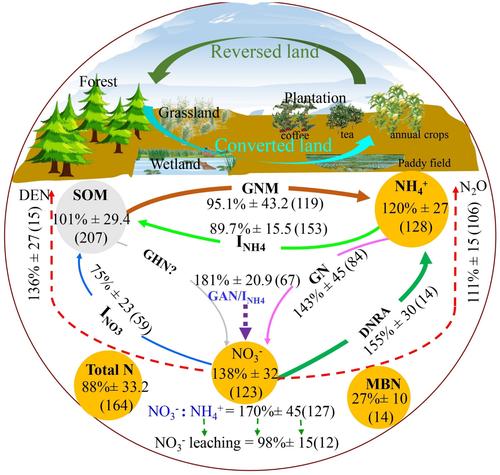当前位置:
X-MOL 学术
›
Glob. Change Biol.
›
论文详情
Our official English website, www.x-mol.net, welcomes your
feedback! (Note: you will need to create a separate account there.)
Global Ecosystem Nitrogen Cycling Reciprocates Between Land‐Use Conversion and Its Reversal
Global Change Biology ( IF 10.8 ) Pub Date : 2024-10-19 , DOI: 10.1111/gcb.17537 Yves Uwiragiye, Jing Wang, Yuanyuan Huang, Liangping Wu, Jiake Zhou, Yanhui Zhang, Meiqi Chen, Hang Jing, Yinfei Qian, Ahmed S. Elrys, Yi Cheng, Zucong Cai, Minggang Xu, Scott X. Chang, Christoph Müller
Global Change Biology ( IF 10.8 ) Pub Date : 2024-10-19 , DOI: 10.1111/gcb.17537 Yves Uwiragiye, Jing Wang, Yuanyuan Huang, Liangping Wu, Jiake Zhou, Yanhui Zhang, Meiqi Chen, Hang Jing, Yinfei Qian, Ahmed S. Elrys, Yi Cheng, Zucong Cai, Minggang Xu, Scott X. Chang, Christoph Müller

|
Anthropogenic land‐use practices influence ecosystem functions and the environment. Yet, the effect of global land‐use change on ecosystem nitrogen (N) cycling remains unquantified despite that ecosystem N cycling plays a critical role in maintaining food security. Here, we analysed 2430 paired observations globally to show that converting natural to managed ecosystems increases ratios of autotrophic nitrification to ammonium immobilisation and nitrate to ammonium, but decreases soil immobilisation of mineral N, causing increased N losses via leaching and gaseous N emissions, such as nitrous oxide (e.g., via denitrification), resulting in a leaky N cycle. Changing land use from intensively managed to one that resembles natural ecosystems reversed N losses by 108% on average, resulting in a more conservative N cycle. Structural equation modelling revealed that changes in soil organic carbon, pH and carbon to N ratio were more important than changes in soil moisture content and temperature in predicting ecosystem N retention capacities following land‐use conversion and its reversion. The hotspots of leaky N cycles were mostly in equatorial and tropical regions, as well as in Western Europe, the United States and China. Our results suggest that whether an ecosystem exhibits a conservative N cycle after land‐use reversion depends on management practices.
更新日期:2024-10-19


















































 京公网安备 11010802027423号
京公网安备 11010802027423号